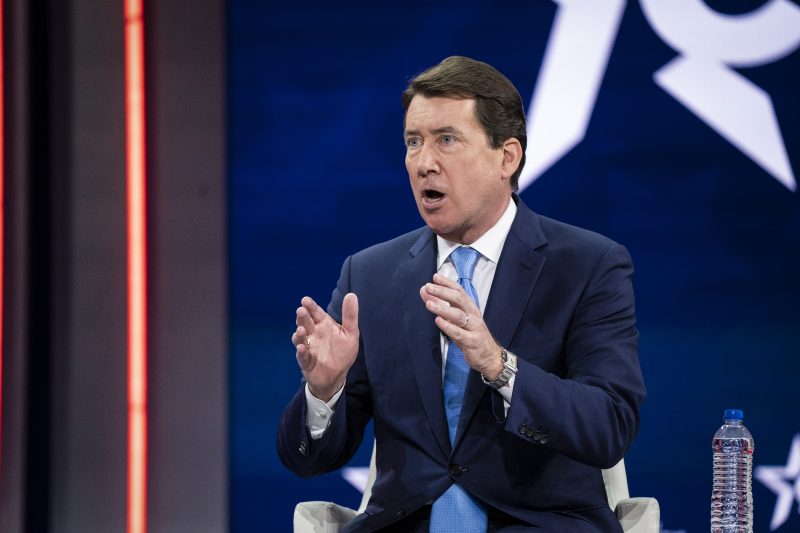“Do you support American taxpayer dollars being used to fly illegal immigrants from countries like Venezuela and Haiti into America to be settled in cities and towns near you? If so, then vote against me. Vote no to preserve this practice of using taxpayer dollars to charter planes that move and import thousands of illegal aliens into your states.”
— Sen. Bill Hagerty (R-Tenn.), in a speech on the Senate floor, March 23
“Have you had to cancel or rethink any upcoming summer trips because of high prices? Don’t worry — your taxpayer dollars will be used to pay for illegal immigrants to fly into a town near you.”
— Rep. Mark Green (R-Tenn.), chair of the House Homeland Security Committee, in a post on X, April 2
Two lawmakers from Tennessee have issued misleading statements about a Biden administration program that permitted an increased use of a process known as humanitarian parole for migrants from Cuba, Haiti, Nicaragua and Venezuela. Hagerty offered an amendment to a spending bill — defeated in a party-line vote — that he said would prevent taxpayer dollars from being used to fly in migrants. Green, on X, posted a Fox News article — headlined “All Senate Dems vote against barring taxpayer funds to fly illegal migrants to US towns” — and made a similar claim.
Under the Biden program, people from these countries who try to cross the border without the proper paperwork are ineligible for parole and subject to expulsion. Instead, before arriving, they must receive authorization to travel to the United States and a statement of financial support from a sponsor.
As of the end of February, the Department of Homeland Security says, more than 386,000 people from those countries had arrived lawfully in the United States while another 19,000 were vetted and authorized to travel. In other words, they are not in the country illegally, despite the rhetoric in the statements.
And beyond the question of whether these immigrants are “illegal,” if you listen to Hagerty and Green, U.S. taxpayers are footing the bill for their travel. That’s wrong.
The website for the program makes clear that people applying for humanitarian parole must pay for their tickets. Under a list of requirements, one is: “Provide for their own commercial travel to an air U.S. port of entry and final U.S. destination.”
When we asked spokespeople for Hagerty and Green, we received different answers about why they said taxpayers’ dollars were involved. Neither is convincing.
Hagerty’s staff said he was referring not to plane tickets, but to the fact that the program was created and administered with taxpayer dollars. His amendment said “no funds appropriated by this Act may be used to facilitate, provide, or purchase air transportation from a foreign country to the United States” — so “facilitate” is the operative word here.
But the arm of DHS that administers the program — U.S. Citizenship and Immigration Services (USCIS) — is 96 percent funded by fees paid by people seeking to come to the United States. For instance, people in the parole program must pay as much as $520 to file an application for work authorization.
Moreover, parole applications (now totaling about 400,000) make up an even smaller part of nearly 10 million applications handled by USCIS each year, so the number of people handling the applications would be an infinitesimal part of the USCIS workforce. On top of that, the salaries of these workers are funded by fees, not congressional appropriations (“taxpayer dollars”).
In any case, as we noted, people approved for the program must book and pay for their own flights to come to the United States. There aren’t any charter flights, despite what Hagerty said.
Green’s staff offered a different explanation — that he was referring to nongovernmental organizations being reimbursed for transportation costs through the Shelter and Services Program (SSP), run by the Federal Emergency Management Agency, another arm of DHS. But this is also off base.
The SSP is focused on helping pay the costs for people who cross the border between ports of entry, such as with the help of smugglers, and find themselves abandoned in the middle of a desert. The recipients are mainly border cities and charities that assist these undocumented immigrants with food, shelter and transportation. But people in the parole program arrive with authorization and a confirmed financial sponsor. In fact, the Biden administration created the parole program to reduce unauthorized border crossings that have burdened border facilities.
So the only way SSP dollars would be used by someone in the parole program is if a disaster happened and this person found themselves in a shelter that received some funding from the SSP — a highly unlikely prospect.
Hagerty and Green are peddling a blatant falsehood here — that the Biden administration is paying for the flights of migrants from four countries in the parole program. In reality, the migrants must pay their own way. When challenged, their offices resorted to alternative explanations about the use of taxpayer dollars that strain credulity.
(About our rating scale)
Send us facts to check by filling out this form
Sign up for The Fact Checker weekly newsletter
The Fact Checker is a verified signatory to the International Fact-Checking Network code of principles



























